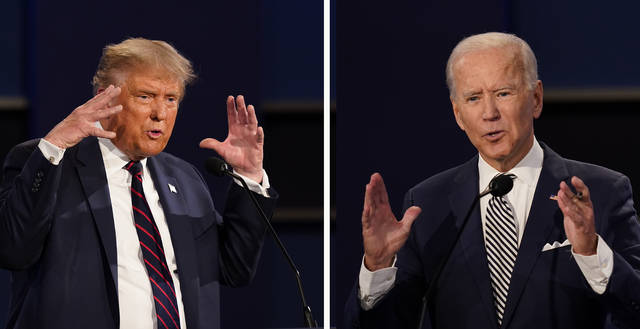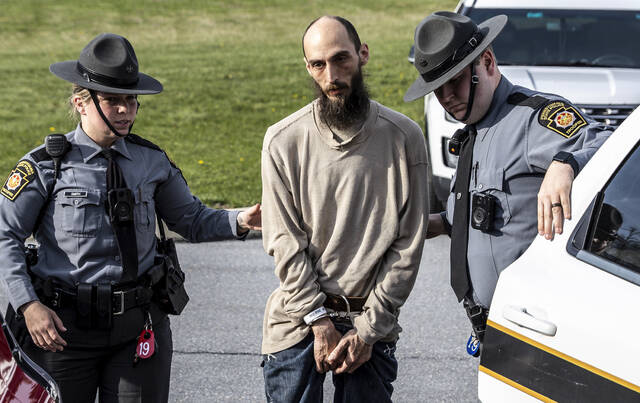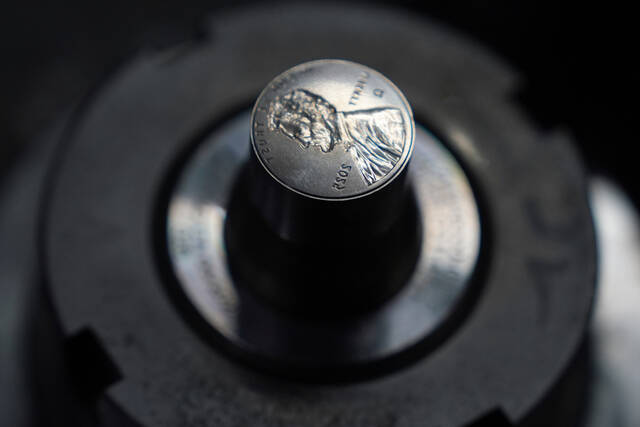After hard fought games, win or lose, even if they feel the officials made bad calls, football coaches walk across fields, shake the other coach’s hand and say “good game.”
Should it hold that President Trump loses his bid for reelection to Democratic challenger Joe Biden, Joe DiSarro, a professor of political science at Washington & Jefferson College, expects Trump to ultimately do the same in some form of concession.
“It’s critical for this country to have reconciliation,” DiSarro said Friday, as results showed Biden pulling ahead of Trump in Pennsylvania, which would cement the 270 Electoral College votes Biden would need to win.
A concession speech “is the point where reconciliation is achieved,” he said. “It doesn’t have to be a long speech. It doesn’t have to be praising the opposition. You need finality here. We don’t need a campaign to continue. It’s so important to democracy.”
While not required, the losing candidate has given a concession statement or speech in every presidential election since 1896, when William Jennings Bryan sent a telegram to William McKinley. It happened even in the contested 2000 race, when Democrat Al Gore gave and then rescinded a concession to George W. Bush before conceding a second time after the election went to the U.S. Supreme Court.
The 2000 race is on everyone’s mind, said Philip Harold, a professor of political science at Robert Morris University.
“This could very well be settled by litigation,” he said. “Politicians are always aware that every word and every phrase impacts perception. You say one thing that’s off and then it will be used against you. Something like a concession speech, that would end it. So, if you want it to be settled in the courts, you don’t want to give a concession speech.”
At six-and-a-half minutes, Gore’s concession, in which he expressed disappointment and acknowledged his supporters’ disappointment while calling on the country to unite and support Bush, was “beautiful,” said Alison Dagnes, a professor of political science at Shippensburg University.
“When you concede, what you are doing is you are not only telling your opponent that they won, you are telling your supporters that you acknowledge that you’ve lost and, this is the most important part, you are telling the world that America has a democratic system and that the American democratic system is more important than one person.”
Will Trump give a concession speech that does that? “I don’t think so,” she said. “He’s not indicating in any way that is on his agenda. By really alleging, without any evidence, fraud, by alleging this election was stolen from him, a baseless allegation, what he is doing is the opposite of all of that.”
DiSarro is more optimistic and expects Trump, aware of his place in history, to make a speech in which he wishes the new president the best and offers his help.
“He doesn’t want to go down in history as being a sore loser. At some point, he’s going to have to say he lost, however, the nation, democracy, is more important. That’s the way it has to go,” he said. “You have to end on a positive note. You end with a handshake. This bitterness has to end.”
DiSarro would expect Biden to do the same if he should lose in the courts.
“There’s no point in continuing the campaign after the election results are in and the court decisions have been finalized,” he said. “You lost the game.”
Dagnes said Trump won’t cast himself as the loser, sore or otherwise, and instead continue his argument that the election was stolen from him.
“As long as he can convince his supporters that this was stolen from him, and that the Biden presidency is illegitimate, that is part and parcel of his plan for whatever is next for him,” she said.
While Hillary Clinton conceded to Trump in 2016, Trump was never afforded the “honeymoon” period a new president has traditionally received after an election and was immediately attacked as illegitimate, Harold said.
“That’s the kind of situation we could very well face, no matter which candidate comes out on top,” he said.
“Instead of creating a strawman of what we think he might do, we have to see how it plays out,” he said. “There should be a gracious concession speech. There should be a bringing of our country together. There should be a honeymoon period. It’s the job of the losing candidate, but also of media figures, the pundits, the political commentators to have some reflection. In this case, is this really the way we want to conduct a ballot?”
If Trump gives a concession, Dagnes said she expects it to be filled with grievance, anger, falsehoods and division.
“What a concession speech is supposed to do is bring Americans together. At their best, concession speeches are meant to signal that we can be political opponents without being enemies,” she said. “President Trump has never indicated his belief in that truism.
“I don’t see any evidence at all that he would give any kind of concession speech that is geared toward healing. It would be very out of character,” she said.
Harold said what Trump wants is faith in the democratic process and confidence in the results.
“Mail-in ballots aren’t doing that. That’s been his position all along,” he said. “We have the process of litigation to see if those concerns are valid.”
With votes still being counted and legal challenges threatened, it’s not yet the time for a concession, Harold said.
“Just because you say I’m not going to concede today because there’s questions about the election process does not mean you are not going to concede ever,” he said. “We’ll see. We might be surprised. He’s a candidate of surprises.”








